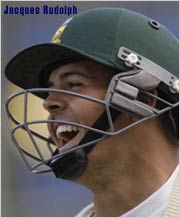The colours of life
Bharath Kedlaya
Let me ask you a simple question. If you had to pick, in whose shoes
would you want to be right now?
Justin Ontong's or Jacques Rudolph's.
I for one, wouldn't want to be in either's. Imagine poor Rudolph's
feelings. The stylish young player is making runs by the tons, and also
has the faith of the team management to back that up. When he is finally
selected into the Test eleven, he finds out that he has to make way for
another player - a player who for all his talent, has found his way into
that particular eleven for reasons entirely unconnected with his
cricketing abilities - the colour of his skin.
 Now spare a thought for poor Ontong. When you finally make your debut for your country, it is an occasion you want to remember for the rest of your life. You want your team-mates to welcome you with open arms. To make you feel comfortable.
Now spare a thought for poor Ontong. When you finally make your debut for your country, it is an occasion you want to remember for the rest of your life. You want your team-mates to welcome you with open arms. To make you feel comfortable.
To give you a sense of belonging. To have their respect for your
abilities as a capable member of the unit. But instead, imagine the
unspoken thoughts running through the minds of Ontong's team mates. That
he may not entirely belong. That he may not *deserve* to belong. Because
a possibly more talented player is sitting out because of orders from
the powers-that-be.
Apartheid is undoubtedly one of the worst forms of discrimination among
human beings. A human being who believes he is superior to another,
merely because of the tint of his skin, is a disgusting and
reprehensible creature. He is the very embodiment of the heights of
perversions that mankind is capable of reaching.
Sadly, over a period of time we have seen entire countries engaging in the practice of apartheid. In the process, numerous generations of an entire people have not been allowed the basic courtesy of even being thought of as, as
fellow human beings.
Mercifully in today's civilised world, such practices are not as
rampant, nor are they as blatant. The modern world actually strives to
deliver justice for the past crimes committed on a race. The 'victims'
are sought to be integrated into their rightful place in the mainstream
of civilisation through many instruments. Among them is the
controversial one of reservations.
Reservations as an instrument of delivering social justice is certainly
a fast one. One administrative decision, and (snap!) the guys are in!
But inevitably it tends to cause a lot of heartburn. Deserving non
-coloured candidates who miss out tend to feel hard done against - that
they have been unjustly treated for no
personal crime of theirs, and have been discriminated against,
ironically because of the hue of their skin.
The policy of reservations can also tend to lead to a deterioration in the general standards, as not all of the people included may have the requisite competence for the job.
 Maybe some other means other than reservations can also be explored.
Means not entirely just in the larger sense, but probably less unjust
and certainly less blatantly so. These means may be like providing free
cricketing equipment and free coaching facilities among others, to
coloured kids. Also maybe schools in black townships which have cricket
teams of their own can possibly be provided with additional financial
support.
Maybe some other means other than reservations can also be explored.
Means not entirely just in the larger sense, but probably less unjust
and certainly less blatantly so. These means may be like providing free
cricketing equipment and free coaching facilities among others, to
coloured kids. Also maybe schools in black townships which have cricket
teams of their own can possibly be provided with additional financial
support.
Coloured kids taking part in cricket at schools and doing well
at it can be waived a part or all of their tuition fees. I'm sure many
such similar schemes can be thought of by the South African government
in consultation with the cricket board.
I don't see a reason why such policies will not produce coloured
South-African kids in the medium term - five to seven years - who will
not make it to the national squad purely on merit alone, without the
uncomfortable crutches of reservations. Yes, these options can
financially cost more in the short term. But I believe that in the long
term, it will be worth it all.
These methods may have a whiff of reverse discrimination in them by
seeming to encourage coloured kids more than others to do well at the
game. But I am sure that, that discriminatory feeling will be easily preferred by Jacques Rudolph over the one which he may be experiencing now. Also these uncharitable remarks of 'no-ability-only-colour' will cease to be heard when a
coloured player is selected to the eleven. And I think Justin Ontong too
will prefer to have it no other way.
Editor's note: Rediff believes that like its own editorial staffers, readers too have points of view on the many issues relating to cricket as it is played.
Therefore, Rediff provides in its editorial section space for readers to write in, with their views. The views expressed by the readers are carried as written, in order to preserve the original voice.
However, it needs mentioning that guest columns are opinion pieces, and reflect only the feelings of the individual concerned -- the fact that they are published on Rediff's cricket site does not amount to an endorsement by the editorial staff of the opinions expressed in these columns.
Mail Sports Editor